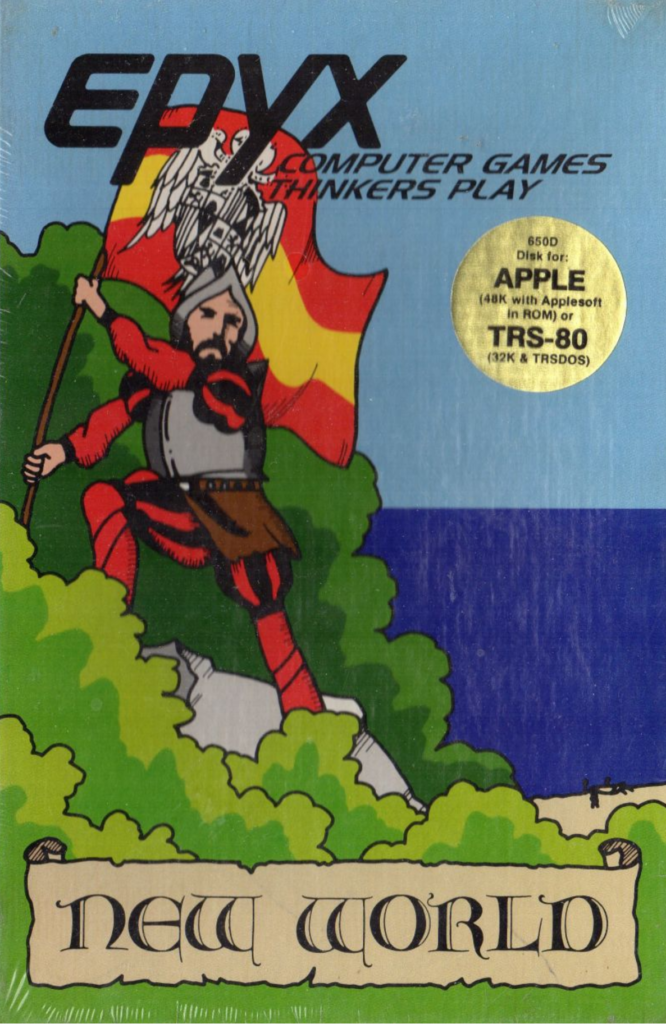
– Any news from our settlers in the Caribbean?
– They all died ! But gold keeps piling up on the dock for some reason. We will grab it within the next 15 years.
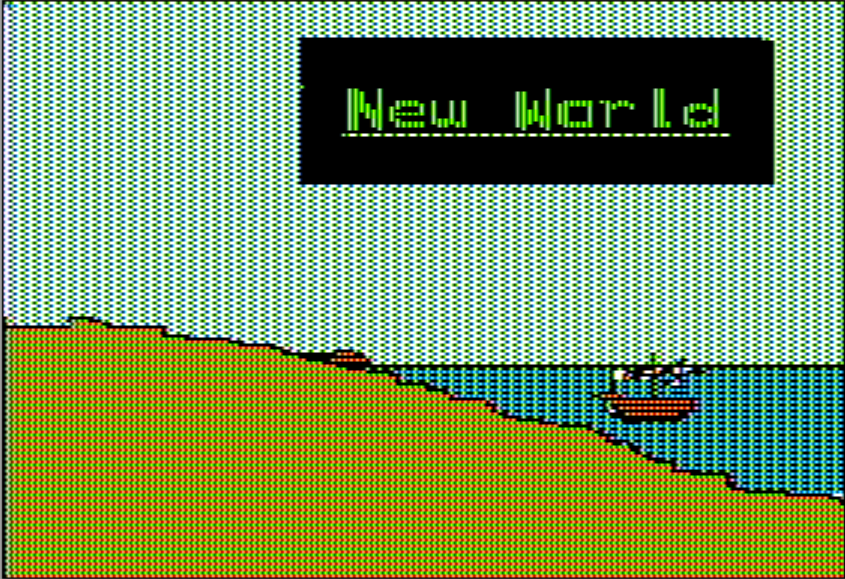
“No”.
Year 1495
The year is 1495. Rex Catholicissimus Testo of Unified Spain decides we should colonize what seems to be a new continent on the other side of the Atlantic.
Sadly, it seems that our French rivals have the same plan, and are willing to invest a lot more than us. On the other hand, the English apparently found the prospect of colonisation abhorrent the minute the French announced they were into it, and the Portuguese, ah who cares about them, so that’s only us and the French :

The New World has already been mapped and is divided into 13 regions. It looks like the French already occupied New Mexico, before anyone occupied Mexico in the first place.


The French already have 6 colonists there, and 6 soldiers. On my side, I only have 2 colonists to allocate.
Well, I don’t like that. The New World is mine ! Finders keepers ! Get your own continent ! The first thing I do is recruit a bunch of soldiers to chase the French away before they endanger the local frog habitats.
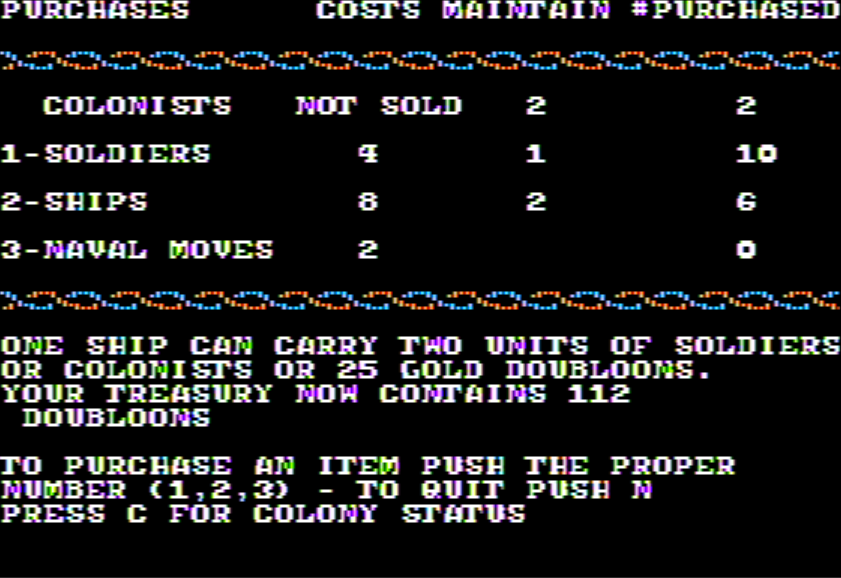
In New World, a ship has 2 in transport capacity, so I need 6 for my 10 soldiers and 2 for my colonists. I also need naval moves, but more on this later.
And after recruiting my men, I immediately toss them in an early iteration of the battle of New Orleans :
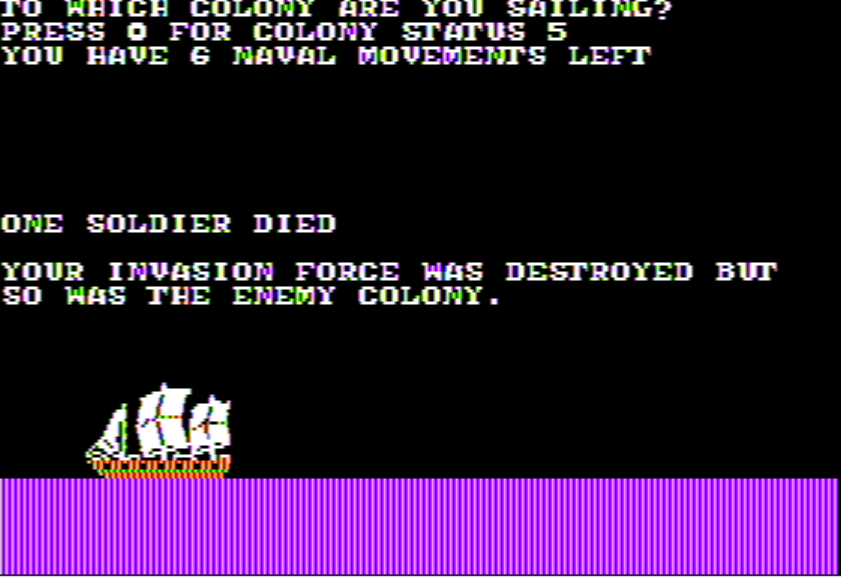
Success ! Everyone died, so I will not even have to pay maintenance cost !
That leaves my two colonists. Colonists only generate meagre revenue initially, but you know what generates a lot of revenue ?
Gold mines !
And what do you know my surveyor gave me a handy booklet with the list of places where gold mines could be :
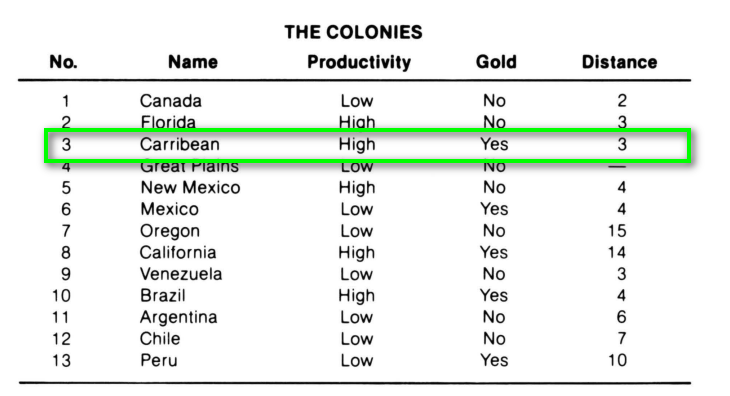
So the Caribbean it is. And soon :

Spanish civilization ! I am sure the locals will say “me gusta!“
Next step :

I am lucky, and find the gold immediately ! This means the island now generates 25 gold per turn, which I will have to ferry home.
Year 1500
Not a great year. First, all my colonists died in the Caribbean, which is not that bad because the colony is still considered mine for some reason, so 25 gold is still somehow being produced every turn (=5 years). Probably by local volunteers who like the King of Spain very much.
Second, I got involved in some petty little war in Europe by event, which means I cannot recruit soldiers this turn. On the other hand, I have a bunch of colonists. I send them, unescorted, to colonize New Mexico under the name Newer Mexico.
Third, the French decided to settle in California for some unfathomable reason. Possibly they want to corner all the wine-producing regions in the world. There are only a few of them (6 colonists and 3 soldiers), but I don’t have any soldier so there is nothing I can do.
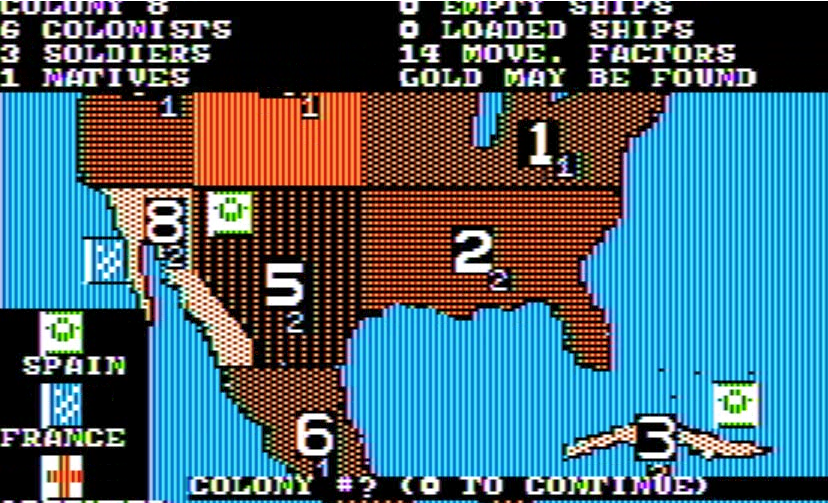
Year 1505
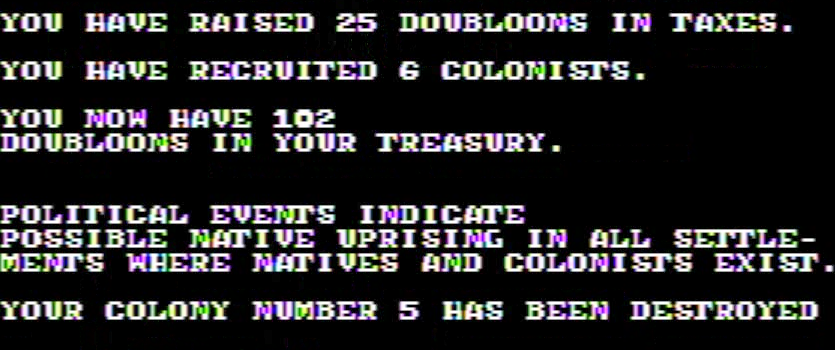
Damn !
Well, I received 6 more colonists this turn, so let’s create another settlement : Newest Mexico ! This time I bring soldiers with me, to eliminate the native threat. And, later, the French threat.
Year 1510
The year of my first gold convoy. It is better to let gold accumulate a bit before bringing it back. In New World, the cost of moving fleet around is 2*distance, whatever the size of the fleet, so transporting gold from the Caribbean to Spain costs 12 in total (for the back-and-forth), whether there is one ship worth of gold (25 gold) or 3 ships worth of gold (75 gold).
1510 is also the year when the French settled in Florida. Newest Mexico is surrounded !
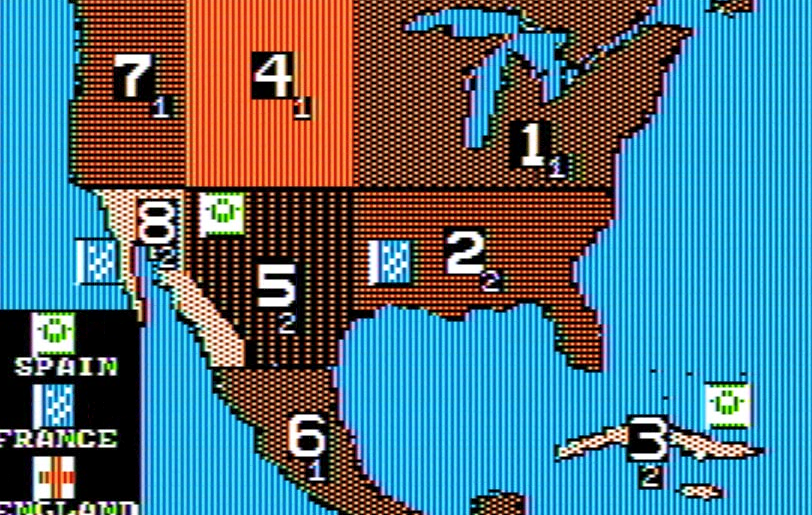
Well, that’s just more places where I will have to chase the French from.
Years 1515 to 1530
Not much happened these last 20 years. I am settled down, and my colony grew to 14 colonists thanks to migrants from Spain (there is no organic growth in New World). Sadly, these colonists barely pay themselves, generating 28 in revenue… for 28 in maintenance.
Most of my revenue comes from taxes (10 to 50 every turn) and from the gold I bring back from Santo Domingo. Sadly, I have expenses too : ships sink from time to time, once with the gold from my colonies, and I need to replace them. Even when not sinking, they have a maintenance cost. Between replacements, ship maintenance and naval moves, profit is very limited.
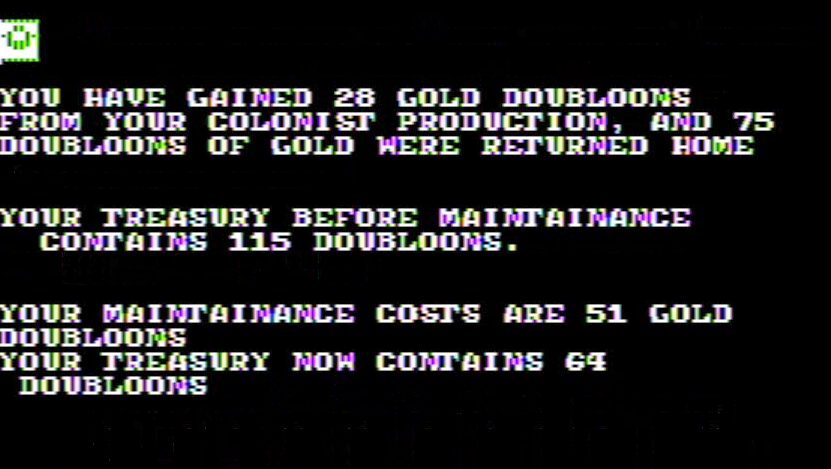
France is not much more profitable, but well, France and deficit go together like onion and soup.
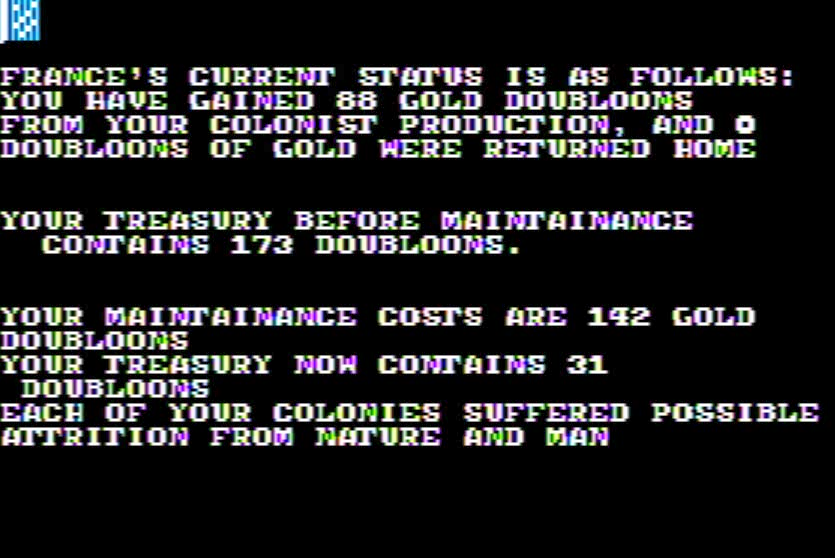
France still has only 2 colonies, but they are full of soldiers and settlers – no way I attack them.
Year 1535
Finally ! In 1535 my colonists start to pull their weight, bringing 4 in revenue each, so 2 net per colonist after deducting maintenance – I am not sure what was the trigger for this change of scale though, I just know by experience that it happens at some point.
The same thing happens to France, which avoids bankruptcy at the last possible moment :
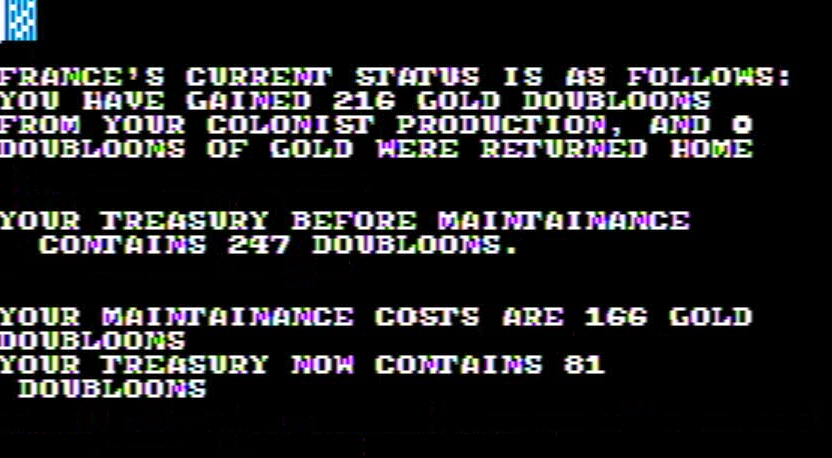
They also started to colonize Brazil. I am not interested.
Years 1540 to 1560
Not much happened these two decades. My revenue went up as my number of colonists reached 32, but not as much as I expected, because my Caribbean mine ran out so no more gold convoys. Meanwhile, the French were now surrounding my colony, having settled Canada and Oregon. Their revenue and cash level was becoming limitless… and also irrelevant, as the AI never attacks and does not play by the same rules as I do.
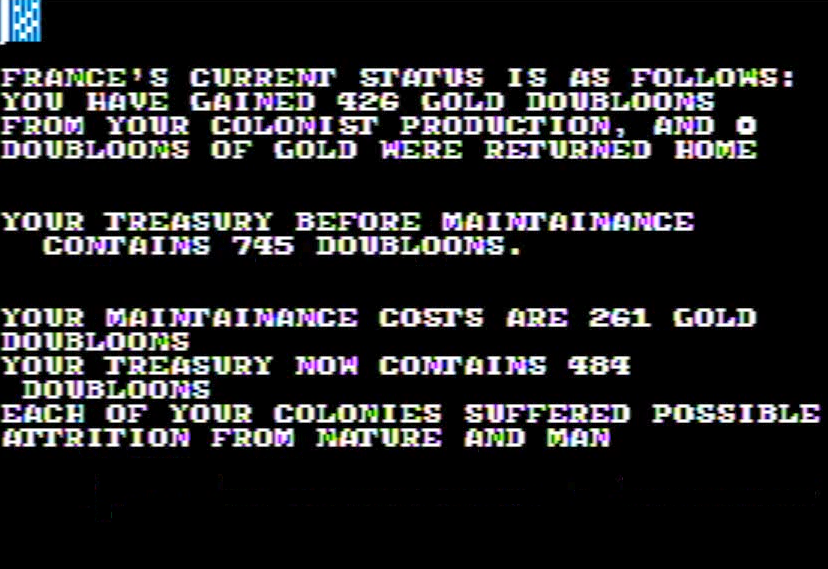
Anyway, this cash had been useful, and in 1560 I had quite the army in Newest Mexico : 28 soldiers.
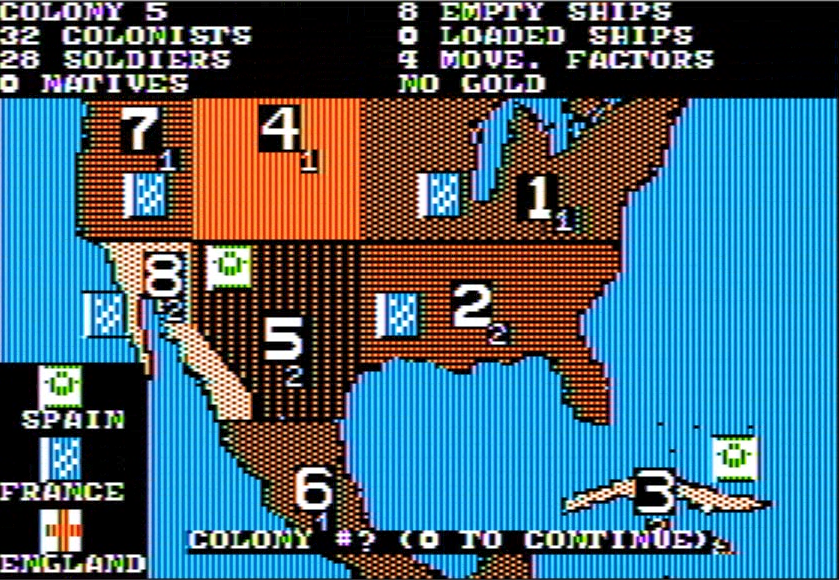
Time to liberate Miami. ADELANTE !
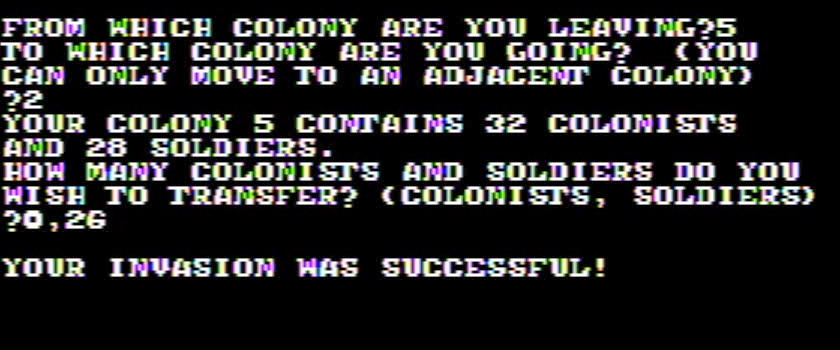
Moving the soldiers first, the settlers second, I occupied and settled Florida with a few colonists and that one soldier who survived the battle. Not that it increased my profit significantly, but at least all those dead soldiers decreased my maintenance costs.
Years 1560 to 1600
The conquest of Florida is the blueprint for the final years : I accumulate a large force over a couple turns somewhere (I can’t transport everything at the same time), and then launch everything against a French region, with one of 4 possible results :
- All my force destroyed, no losses for the enemy,
- Destruction, with the enemy left with only an handful of soldiers – though they replenish fully the following turn,
- Mutual destruction,
- Victory, with my army left with one or two soldiers,
I snatched California, but was pushed back from Oregon. I also tried a landing in Brazil, but it was repulsed. In the final turn (1600), I assaulted and occupied Québec, securing most of North America (though almost all settlers were in Newest Mexico). At the end of the game, the French still occupied Oregon and most of South America, with a much larger population everywhere.
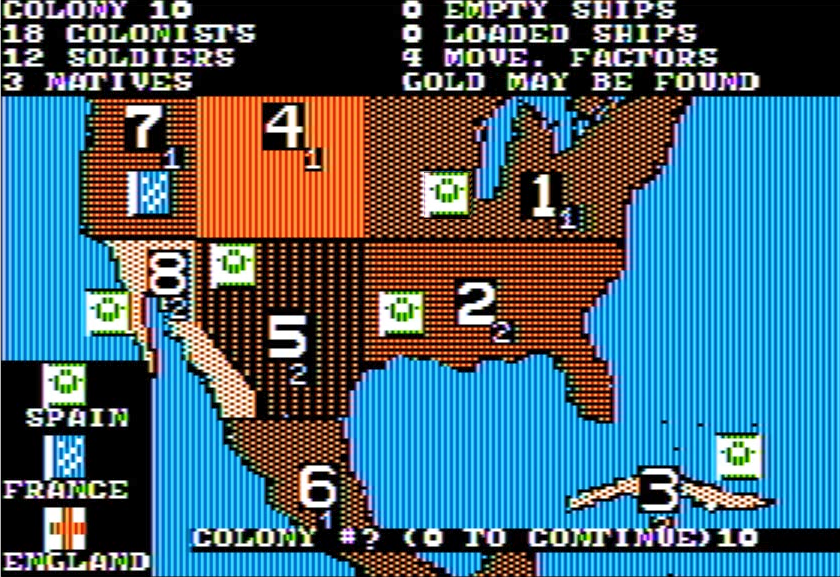
At the end of 1600, it was time to count points.
The game gives 50 points by colony, 1 point per soldier, 2 points per settler and, critically, 1 point by doubloon. Let me tell you that France had almost two thousand of the latter, when I had almost nothing, as those soldiers had been expensive. Consequently :

Review and Ratings
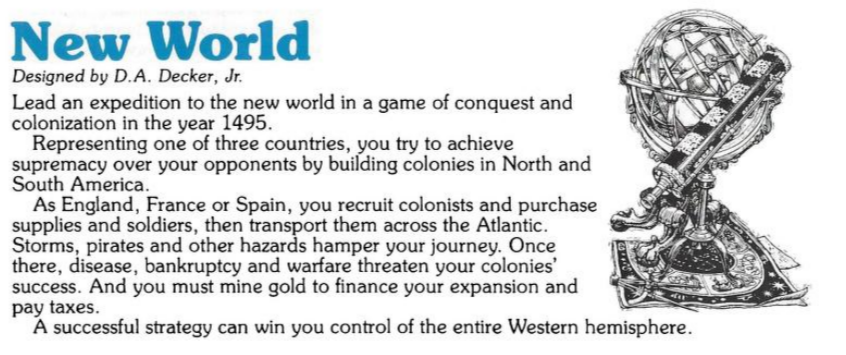
New World by D.A. Decker Jr, published by Epyx
First release: December 1982 on Apple II and TRS-80
Tested on : Apple II emulator and TRS-80 emulator
Total time tested : 4 hours
Average duration of a battle: 40 minutes
Complexity: Average (2/5)
Would recommend to a modern player : No
Would recommend to a designer : No
Final Rating: Totally obsolete
New World is not the first game we cover from Epyx, the new name of Automated Simulations. I’ve already discussed Starfleet Orion and Invasion Orion, the first games developed by Jon Freeman when he founded the company in 1978 with his partner Jim Connelly.
A lot had happened in the short span between Invasion Orion in early 1979 and New World in December 1982 – enough to fill 3 articles of the Digital Antiquarian. In short, 1979 also saw the release of the pivotal Temple of Apshai, which became the first game of a series called Dunjonquest. After various games reusing Temple of Apshai‘s engine, including Rescue at Rigel, an RPG extremely loosely related to the Invasion Orion universe, Jon Freeman released in 1981 the unique Crush, Crumble and Chomp!, covered at length by the Data Driven Gamer. After this success Freeman… left Automated Simulations in late 1981, frustrated by the decisions – or lack thereof – of his business partner Jim Connelly.
Without his co-founder and most creative designer, Connelly tried to steer the company in a new direction : publishing. He rebranded Automated Simulations into something more punchy but also more generalist : Epyx. By late 1982, one-third of Epyx’s games were from external developers, including 4 adventure games by future billionaire Marc Russel Benioff, a wargame coming soon on this blog (Armor Assault) and New World.
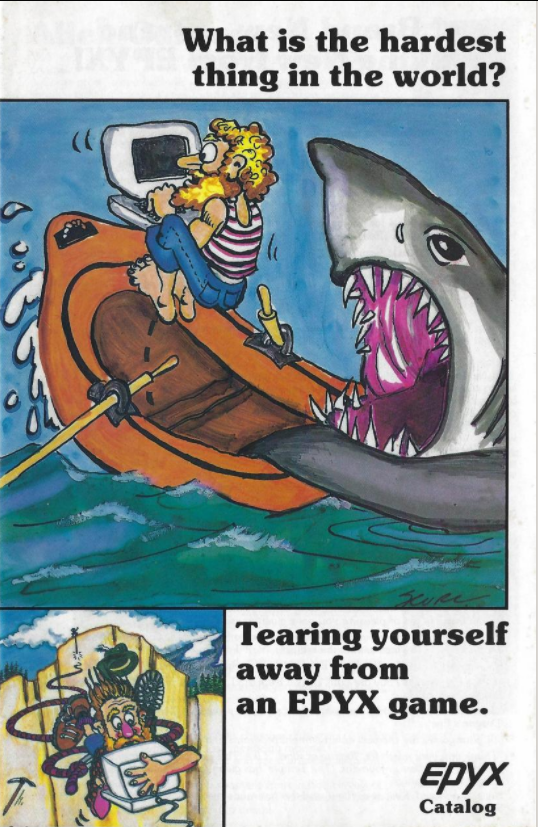
Beyond the review itself, there is extremely little I can say on New World. It is credited to some “D.A. Decker Jr”, who does not seem to have worked on any other video game. From the manual, it seems to have been coded initially on TRS-80, and then ported to Apple II, but in any case the catalogue announced it for both platforms for December (though possibly it was actually delayed, the manual has both 1982 and 1983 trademarks). I cannot find any contemporary review (so no such section in this article), or even mentions of New World – the game seems to have flown totally under the radar. So let’s jump to the review directly.
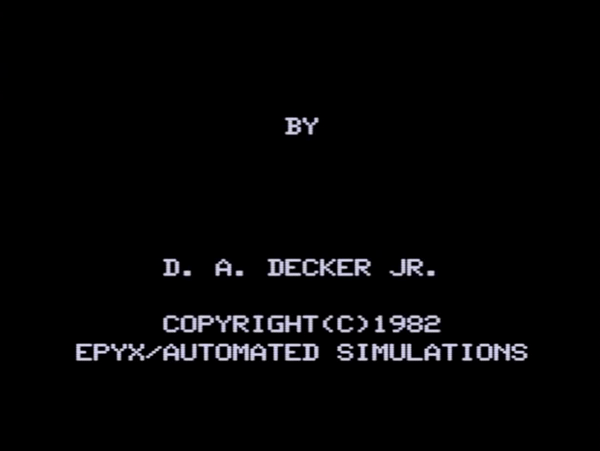
A. Immersion
The manual has a small historical intro, explaining how the New World was colonized by three countries : Spain, England and France – because Portugal does not count.
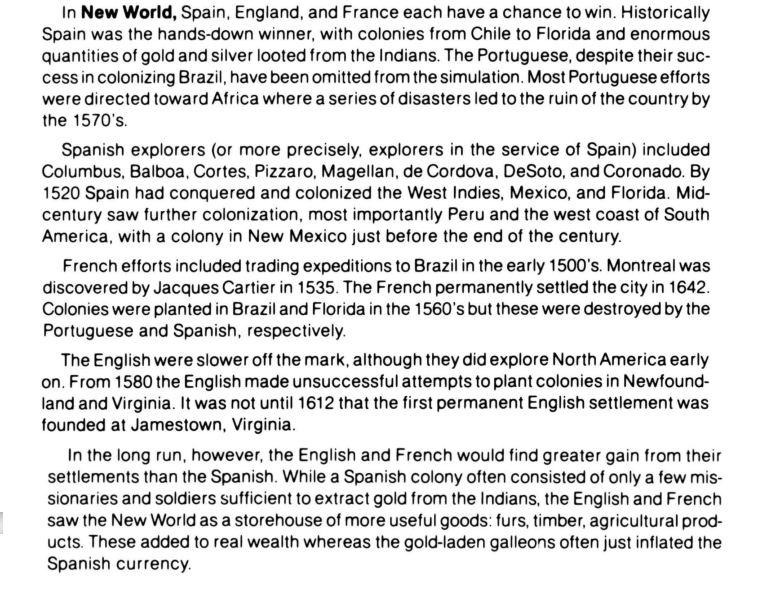
The intro shows some Anglo privilege. The game spans between 1495 and 1600, but the English, who founded their first colony in 1612, are definitely in. Meanwhile, Portugal is out, because come on Brazil is irrelevant and 4 players is one too many. In single-player, it is only Spain against France.
Playing this game, suspension of disbelief collapses instantly : the whole map, its productivity and where gold can be found is right there in the manual, so no exploration. The AI’s pattern of colonization is weird, with the French starting in New Mexico, and in my experience always snatching California in the early turns (historically it was not colonized before the mid-18th century).
The game has some art on Apple II, obviously the TRS-80 had no “high-res” graphics to use and it looks as bad as can be expected.
Rating : Very poor
B. UI, clarity of rules and outcomes
The game is frustrating to play because the commands are unforgiving and the manual unclear.
Let’s start with the manual : it tells you what should have been randomized somehow (where the gold is, productivity of regions), but it does not tell you what you need to know : how combats are resolved (particularly frustrating as it is all or nothing), how the chance to find gold is calculated, how the productivity of colonists increases, what are the effects of natives.
The game is also frustrating to play because it makes very little allowance for mistakes. Actions must be accomplished in a specific order, from 1 to 8 below.
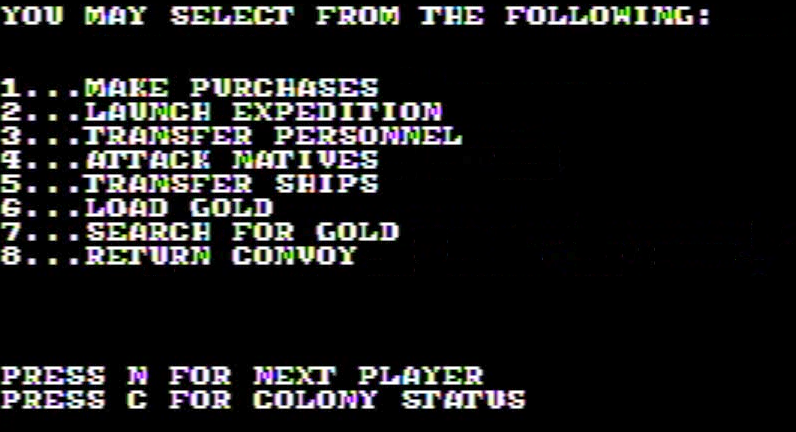
This has consequences. For instance, purchases must be done at the beginning of the turn. If you realize that you are missing naval moves after you started launching expeditions, well, too bad, you can’t go back. If you realize you have too many naval moves, they are lost as well at the end of the turn.
This is on Apple II. On TRS-80, the UI is an unmitigated disaster, because there is no explanation for what all those numbers mean. If you did not play the Apple II version before playing the TRS-80 version, the game is quite simply impossible.
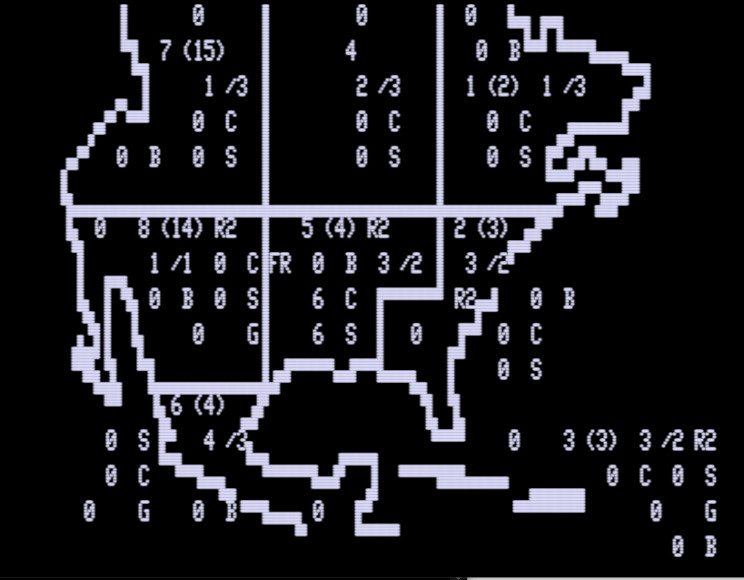
Rating : Terrible
C. Systems
The loop of the game is quite simple, though there are quite a few rules harder to understand :
- Recruit soldiers, buy ships and naval moves,
- Send colonists (generated randomly every turn) with soldiers to colonies,
- Profit through either gold (which needs to be found and brought home) or general colonist production (which starts at 2 gold/colonist – same as the colonist maintenance cost, but scales up – I am not sure exactly how).
- If you are confident, you can try to invade colonies of another country either directly from Europe or from an adjacent region. You cannot move troops from a colony to another by ship, nor return anyone to the metropole, so the Caribbean is a dead end and not the stepping stone it historically was.
The game misses some of the staples one would expect in a Grand Strategy / 4X type :
- The player has no control on how many colonists they receive every turn, which means there is no decision to take between economy and warfare ; the only balance is on whether you want the soldiers now (and pay their maintenance) or later,
- For a game about colonization, the Natives surprisingly have almost no role ; from what I understand in my test they just attack your settlements by event from time to time. I wish you could follow different strategies with them, but no, it is better to just destroy them.
- And of course, the player has perfect information on everything… except the rules of the game.
In my opinion, at least in single-player, the game is all about optimizing colonist allocation (even though you don’t know the rules for colonist productivity) and ship movement — boring.
Rating : Terrible
D. Scenario design & Balancing
There is only one scenario, the AI cheats like crazy, does not attack you and always follows the same colonization pattern.
Rating : Terrible
E. Did I make interesting decisions ?
No.
F. Final rating
Totally obsolete. I would not even call New World a precursor, there was no good idea in it that made it into subsequent colonization-themed games. It is at best a curio, and even if you are absolutely fascinated by this theme you are not missing anything by skipping it.
22/10/2022 addition : Notes from Porkbelly
Commenter Porkbelly found out that New World is actually an (unofficial) port of the 1976 SPI game Conquistador (later republished in 1982 by Avalon Hill), with fewer features but still very recognizable. Examination of the code shows that New World was originally coded on TRS-80 and then ported on Apple II, as it has “porting mistakes” on rounding calculations (“The TRS-80 code likely stored variables as whole numbers, where Applesoft BASIC holds fractions. There are some (rare) instances where you can end up with half a colonist, or half a native… probably not fatal but potentially things can go wonky.“)
Porkbelly confirms that the French AI always colonize the territories in the same order (California in second!), and cheats like crazy. He also checked how production of settlements was calculated :
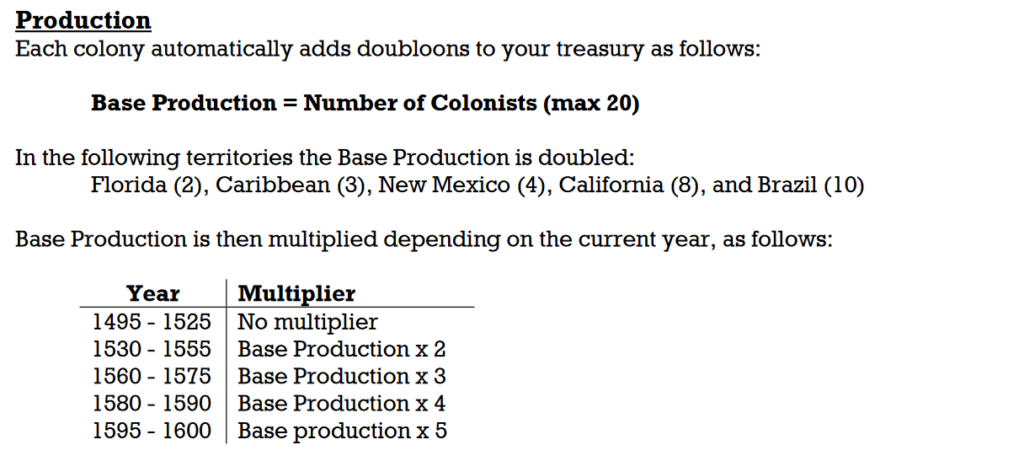
This is the same calculation as in Conquistador.
Porkbelly used his investigation to recreate a manual with every single result table you could use, which I uploaded to archive.org.